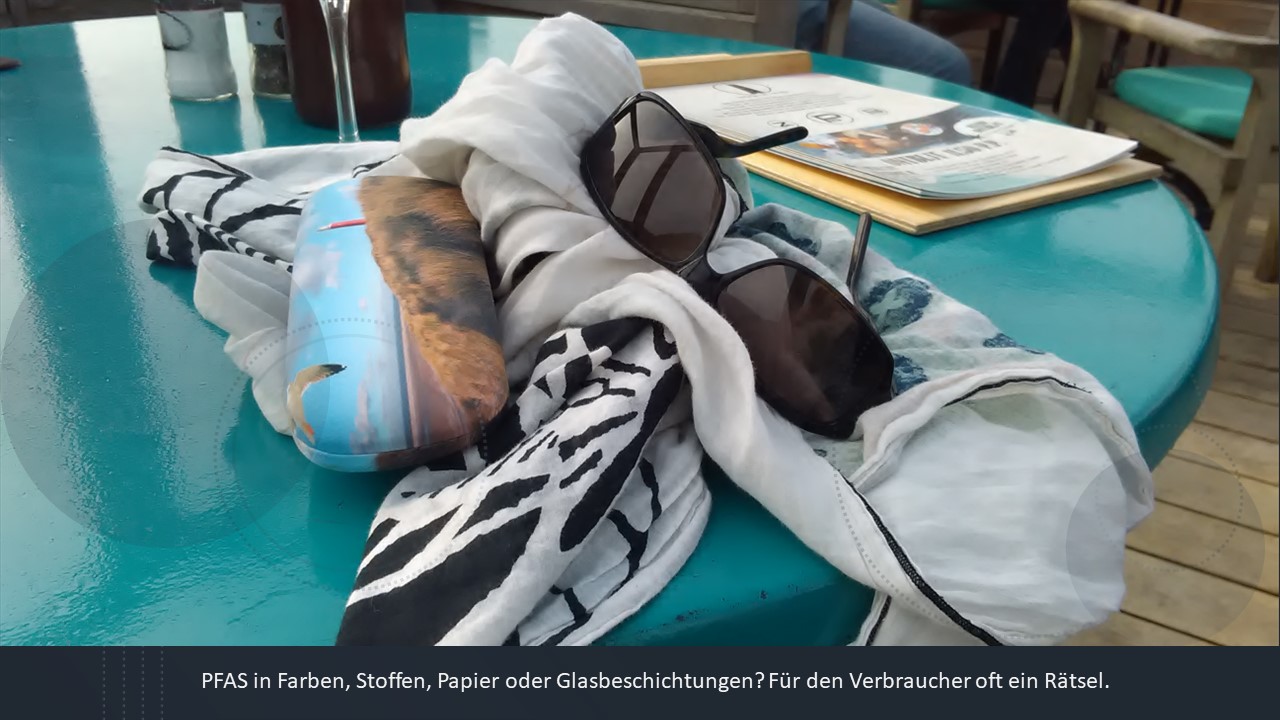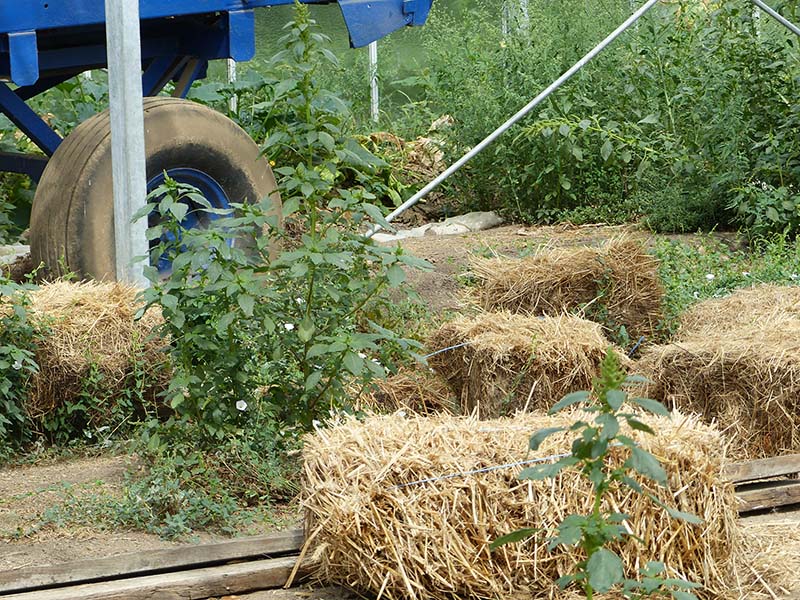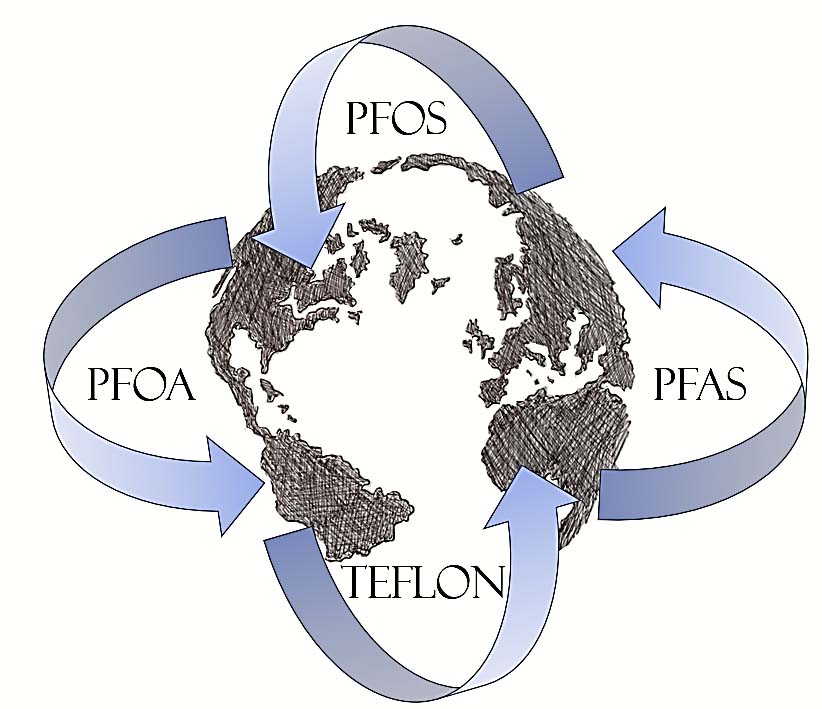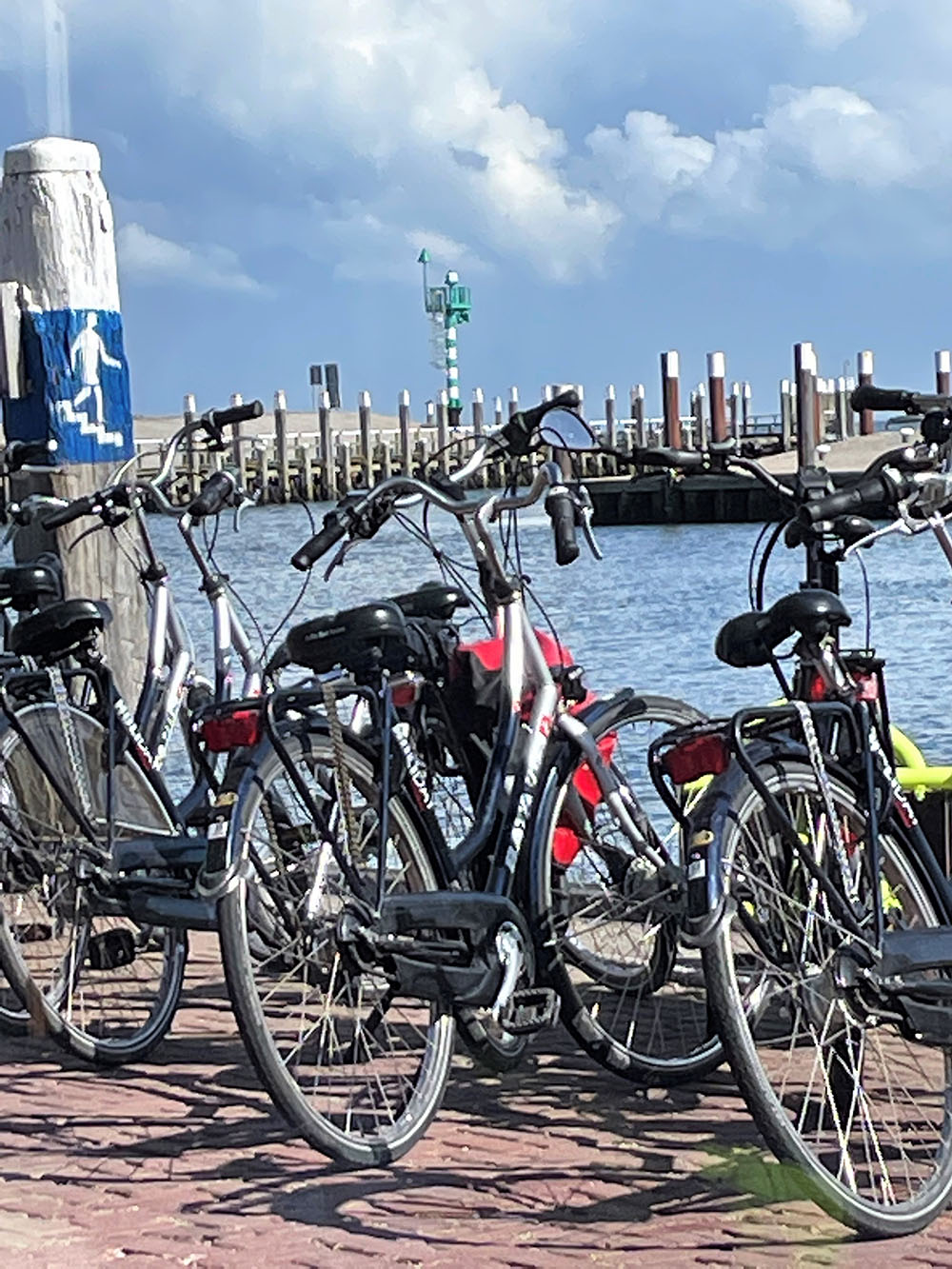On June 12 and 13, more than 100 experts and innovators from ten countries gathered in Rastatt and Karlsruhe (Baden-Württemberg) to pursue a common line at the ZeroPM-special symposium: “A world with fewer PFAS. In lectures and discussions, the latest research results and solutions were presented to banish the "forever chemicals" from our drinking water and the environment”. A world without PFAS? What is already possible today….. My personal view
"Special Symposium on PFAS Elimination from Drinking Water, including a Technology Demonstration"
This symposium was organized by the European research group ZeroPM as well as the Rastatt municipal utilities and the Water Technology Center (TZW) in Karlsruhe, both of which are also part of the ZeroPM project.
The venue proved to be extremely appropriate because, as Reiner Söhlmann, head of the PFAS office at the Rastatt district office, emphasized, “There is a significant PFAS contamination case in the Rastatt area, but many people are not aware of how far-reaching this contamination is and which areas of life it affects.”
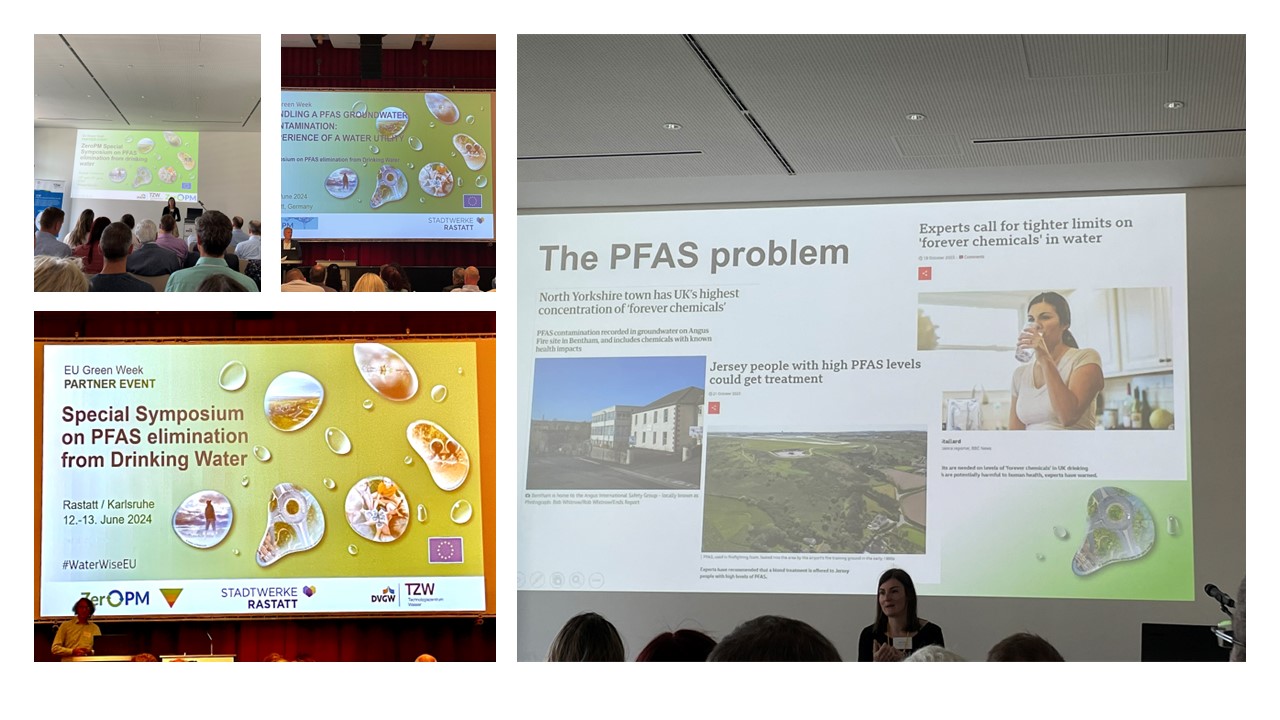
ZeroPM is a research project funded by the EU under the H2020 call “Research and innovation in support of the European Green Deal: Innovative, systemic zero pollution solutions to protect health, the environment, and natural resources from persistent and mobile chemicals." It has a duration of 5 years. The project is led by the Norwegian Geotechnical Institute, with Prof. Hans Peter Arp as project coordinator and Dr. Sarah Hale from TZW as Outreach and Communication Manager.
The ZeroPM project aims to show alternatives to per- and polyfluorinated alkyl substances (PFAS) and raise social awareness of these persistent chemicals, said Sarah Hale. The "Regulatory Watch" has been installed to promote and support political change. The ZeroPM team works closely with the NGO ChemSec, which is also committed to replacing PFAS.
The aim of the symposium in Rastatt/Karlsruhe was to exchange current research results and best practices in dealing with PFAS in drinking water. Participants included scientists, government officials, water suppliers, companies, the German Federation for the Environment and Nature Conservation (BUND), and representatives of the chemical industry.
PFAS without borders
Over the last 80 years, PFAS have found their way into our modern world, from Teflon pans to medical technology to photovoltaic systems. PFAS know no borders, and the careless production, use, and disposal of these chemicals and their products has led to these harmful substances being detectable worldwide in soil, water, air, and even in the human body.
The remediation of PFAS damage is complex and expensive, if it is possible at all. For this reason, the aim is to restrict all PFAS production and use in Europe in the future.
And it must be emphasised that the PFAS contamination in Central Baden, although very extensive, is only a small piece of the global "PFAS pollution puzzle" that was discussed in Rastatt and Karlsruhe.
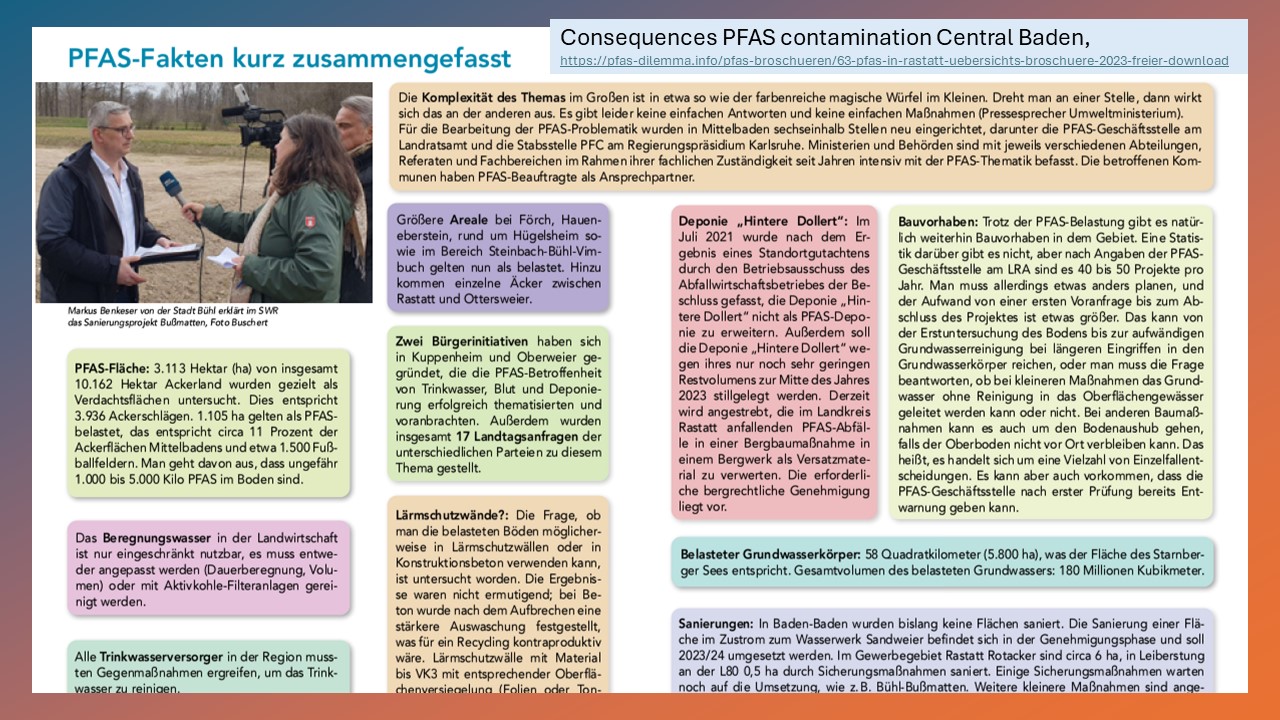
Removing PFAS from the environment: effective strategies and technologies
Many research groups and companies are working on removing the substances from the water. There are effective methods for this, such as activated carbon filters or reverse osmosis systems, as Marcel Riegel from TZW listed in his presentation. But the shorter the PFAS, the less well they are bound, and PFAS residues are created during cleaning, which then also have to be disposed of.
The scientists are therefore testing other methods, such as ion exchangers, electrically stimulated activated carbon, or the electrochemical destruction of PFAS using diamond electrodes. The electrochemical advanced oxidation process (EAOP) with the diamond electrodes can break down the PFAS in the concentrates, which are then mineralized into CO2 and F-. „For achieving the best technical and economical results the EAOP process parameters have to be adapted to the water matrix and the goals of the application. EAOP is not an „copy paste“ technology but based on a building-block concept including pre- and post-treatment steps“, said Barbara Behrendt-Fryda from the company Condias.
Other companies foam the contaminated water and can thus enrich and separate the PFAS in the foam (surface active foam fractionation, SAFF), which is also already in use throughout Europe and was presented by Helena Hinrichsen.
“Chemicals of the century can be removed from the environment” (Marco Müller, Danube Carbon)
Other presentations described the PFAS measures at Berlin's Tegel Airport, the investigations into sewage treatment plants, and the "PFAS approach" in the USA. "People there are aware of the problem, and they want solutions, not pilot projects that will work in ten years," explained Ronit Erlitzki from American Chart Industries.
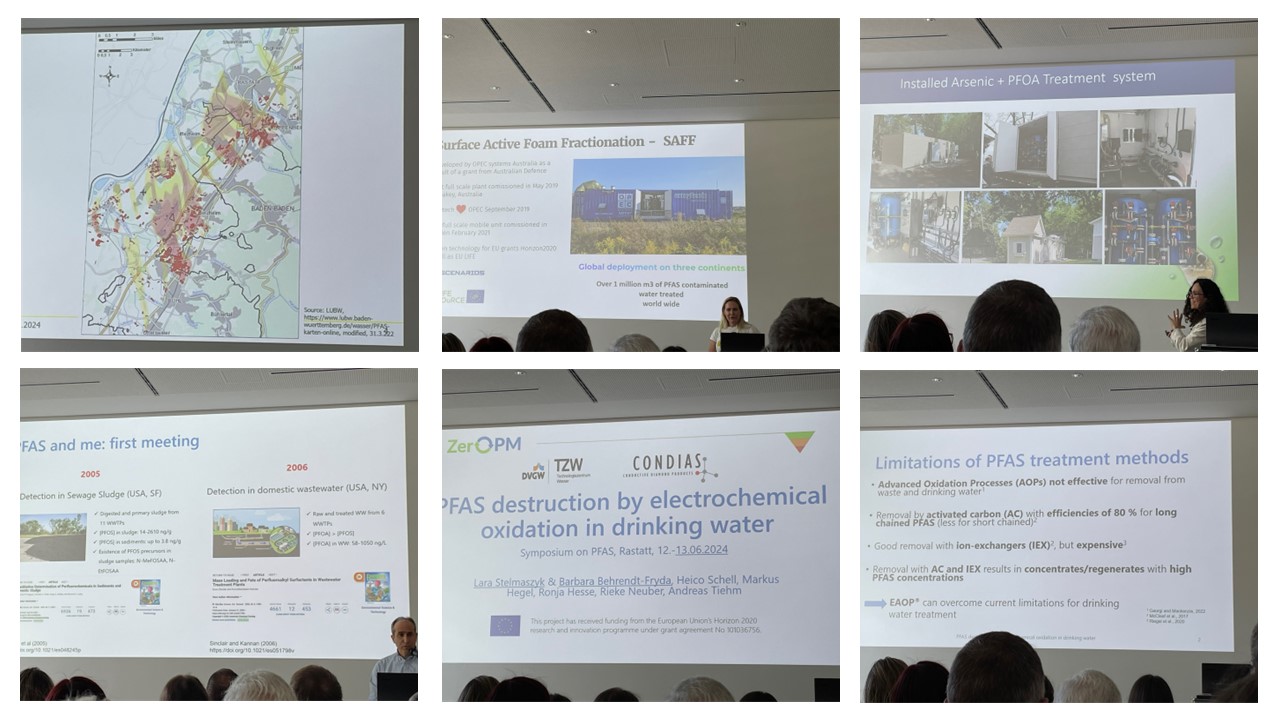
Details about the lectures can be found on the ZeroPM page.
PFAS contamination in Rastatt: Historical development and removal from drinking water
Olaf Kaspryk, the managing director of Rastatt's municipal utilities, took a journey through twelve years of PFAS contamination in local drinking water wells to examine the local impacts. From the first detection to the closure of waterworks to the cleaning and safety of drinking water today, Kaspryk stressed that it was a long road from research to drinking water from the tap and that he was glad that the TZW was supporting him on this journey. To date, the countermeasures have made it possible to remove 2.3 kilograms of PFAS from the water, at a cost of around 15 million euros.
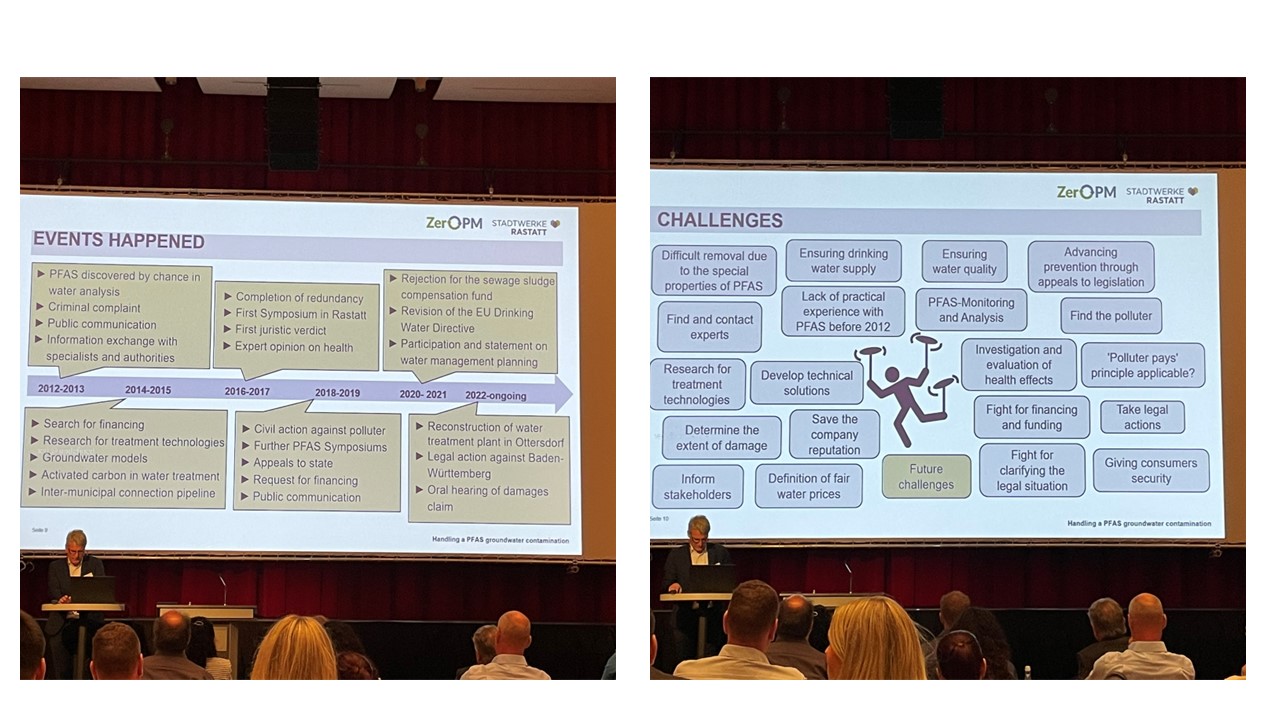
Joshua Walter, also from the PFAS office of the Rastatt district office, summarized the consequences of the large-scale PFAS contamination for the people of our region for the audience: 1,105 hectares of soil are contaminated with PFAS, 480 hectares of which are highly contaminated. What needs to be checked in the region, what solutions have been found here, and what remains unresolved? The health data have been compared with the cancer registry, but so far no increased numbers have been found.
Despite the fact that this „Rastatt-Case“ is often discussed at symposia and workshops, the combination of "measures taken by the Rastatt municipal utilities and countermeasures in Central Baden" was particularly informative and shed new light on the problem. In addition, the urgency of restricting PFAS became even more clear, a necessity that is repeatedly made clear to those affected.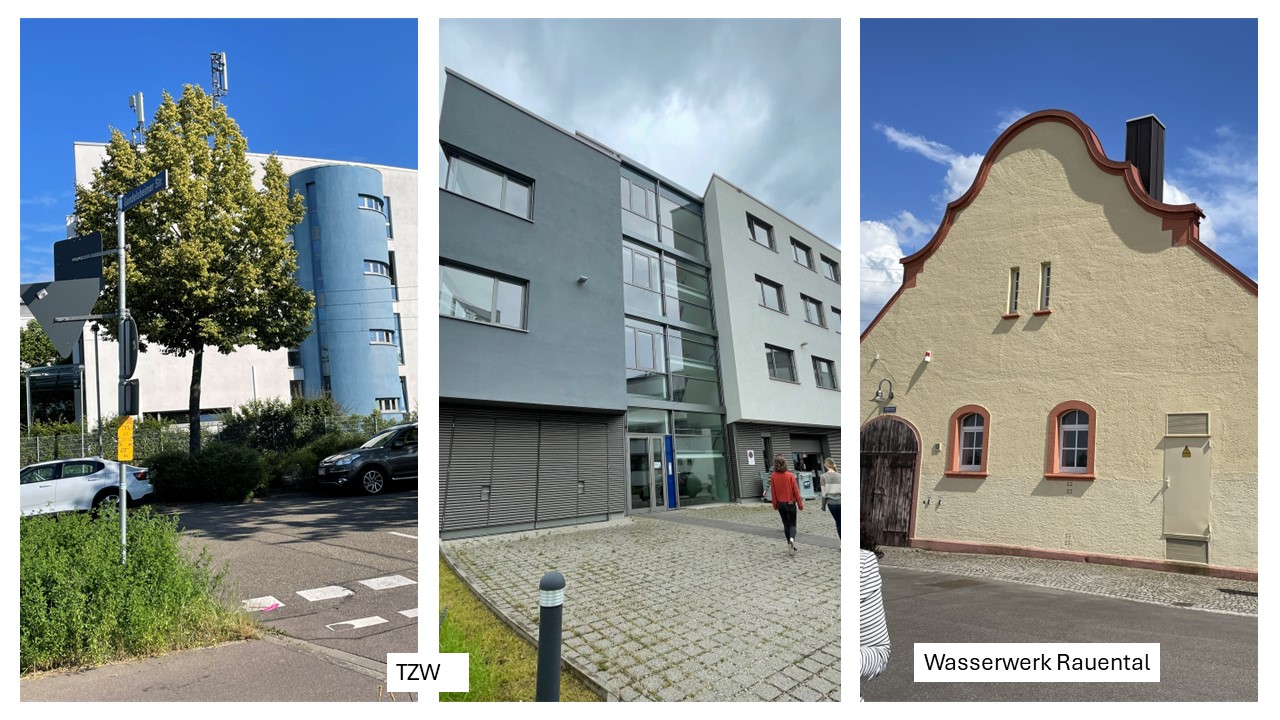
The tours of the Rauental waterworks and the TZW laboratories further reinforced this impression. The considerable effort that has to be made to clean up PFAS here underlines the need for effective measures.
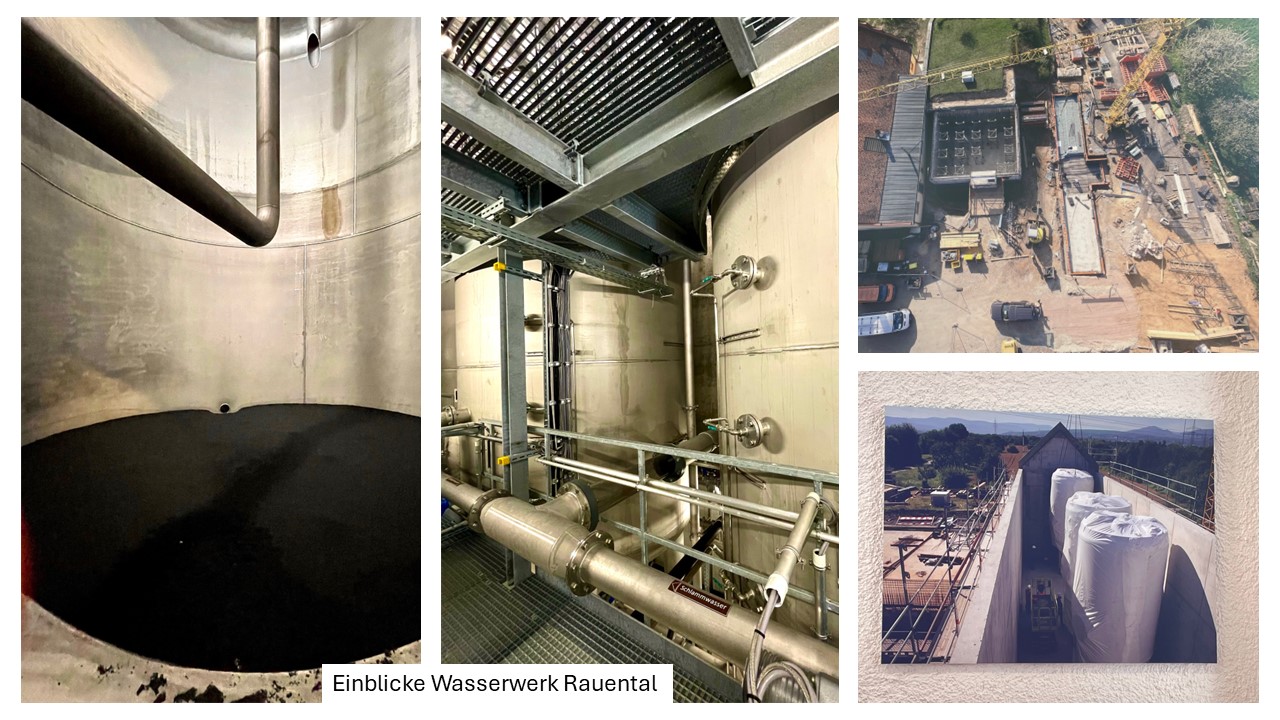
Moods and opinions on the sidelines of the symposium
Reiner Söhlmann: “The ZeroPM project is one of the most outstanding PFAS projects because it comprehensively addresses not only research but also political and social aspects.”
Marcel Riegel (TZW): “Very impressed by the audience, pleased that the symposium has received such a great response from so many people from so many countries.
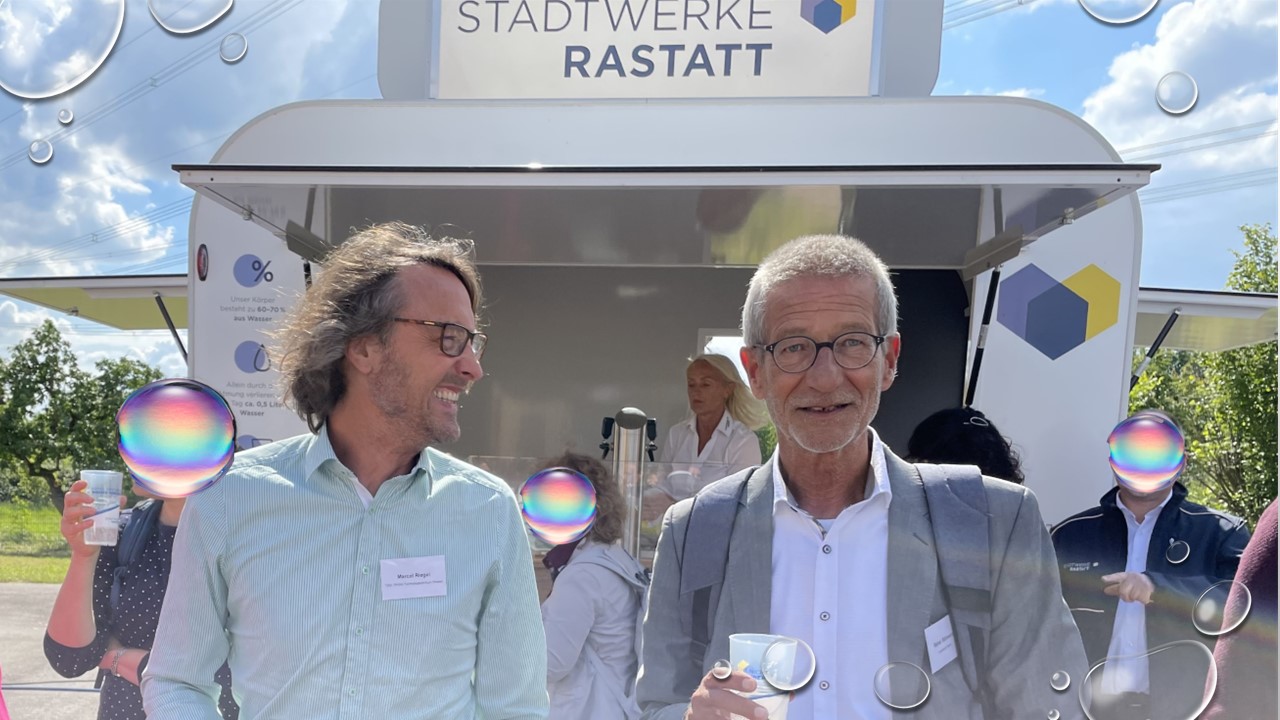
Sarah Hale (ZeroPM/TZW): I was impressed by the many different countries that had gathered here at the symposium, as well as by the magnitude of the Rastatt problem. I am happy about the opportunity for networking and discussions.
Olaf Kaspryk (Stadtwerke Rastatt): "I am very surprised at the progress the ZeroPM project has made within such a short time and also at the level of expertise that was present here in Rastatt at the symposium." For him, this is a sign that Rastatt is now known in specialist circles throughout Europe and deserves recognition for this, as well as for the efforts the municipal utilities have made over the years.
Ulrike Kallee (BUND): I was very impressed by the Rastatt case and also by everything the Rastatt municipal utilities had to do to remove two kilograms of PFAS from the water.
Symposium participant, Netherlands: How many PFAS are still stored in the soil in the Rastatt area? Do they all get into the groundwater, and does that mean that they will ultimately end up in the Dutch North Sea via the Rhine? (Unfortunately, yes).
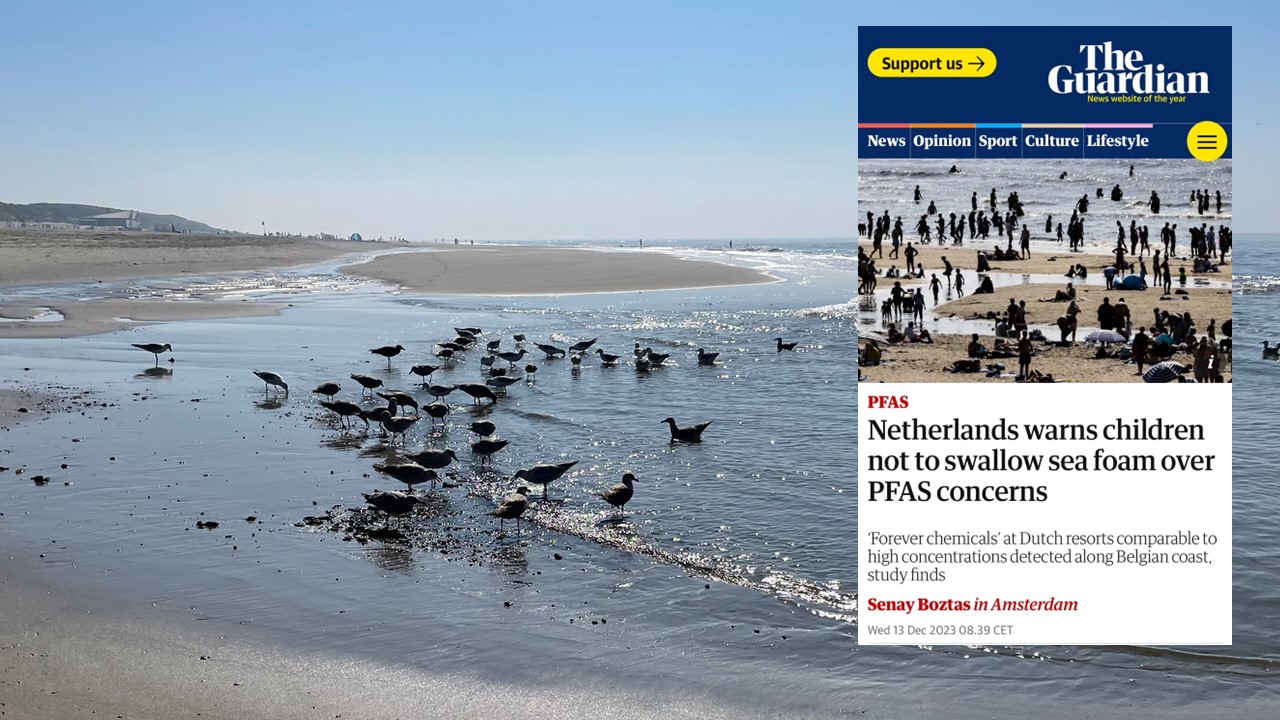
Chemical industry representative: Fluoropolymers cannot be replaced; possible alternatives must first be examined. Don't you have a smartphone?
And then: Switzerland also has a PFAS problem, as does Austria. The latter is partly caused by the Bavarian Gendorf chemical park.
"Fun fact": Wild boars in the vicinity of the Gendorf chemical park are contaminated with PFAS, regardless of whether they are in Germany or Upper Austria. The Gendorf chemical park was identified as the source. And the company Dyneon pays the hunters on both the German and Austrian sides compensation for the PFAS-contaminated wild boars that may not be eaten: 110 euros for a young animal and 220 euros per adult animal. 81 hunting areas in Upper Austria are affected by this. Read more about it here.
Open questions: Where can I find PFAS-free alternative products? Which seals are PFAS-free? Why is there no list and no central contact point?
Will we solve the PFAS problem?
Possibly not in full, and perhaps not as quickly as would be necessary. Too many questions remain unanswered; PFAS are still being produced, and they are not yet regulated as a group. The lobbying of the associations against the Europe-wide PFAS restriction is huge, as is the accompanying "marketing machinery" and advertising campaigns. I was able to experience this for myself in several discussions at this symposium.
Nevertheless, I am cautiously optimistic because the opinion of the experts leaves no doubt that regulation is the right thing to do.
- It was important to see the technologies that already exist for the remediation of PFAS contamination. Not all of them are available for drinking water. But it must be clear that the approach must be to ban PFAS in order to reduce its entry into the environment. (Marcel Riegel)
- Main takeaway: This is about science but also about communicating the facts. (Sarah Hale)
- We need to regulate PFAS at the beginning of the chain. To do this, we need regulations and a clear political framework. (Ulrike Kallee)
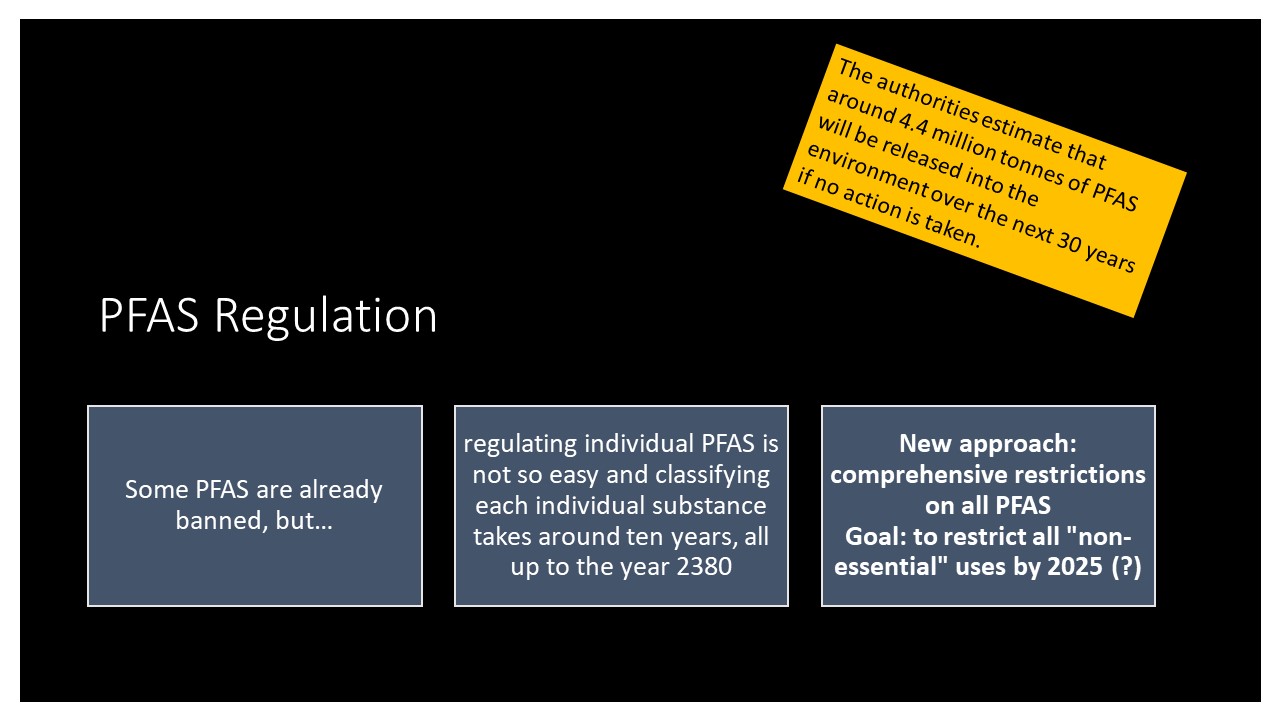
And at this point, of course, many thanks to the organizers for this ZeroPM-PFAS symposium, and special thanks to the organizers Sarah Hale, Maria Philipps, and Marcel Riegel, who ensured a warm welcome, smooth implementation, and, of course, delicious catering.
© Patricia Klatt (text and photos)

